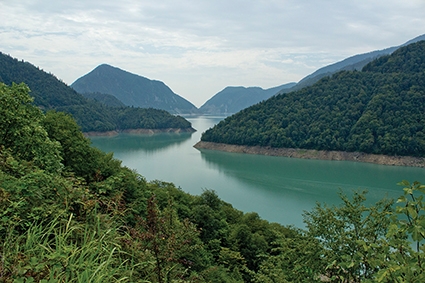The Cracks in the Dam
In the last five days, Energy Minister Kakha Kaladze has made two important announcements. According to the first, the territory of occupied Abkhazia is threatened with full blackout by the end of February. The second suggested that the same occupied territory is no longer threatened by an energy crisis. While political impromptus aren’t new to Minister Kaladze, as the vice-Prime minister is characterized by having contrasting ideas, the issue of Abkhazia’s darkening at first, and then lighting again, is unusual to say the least.
On January 25, a “crawling” schedule was announced on the energy supply in Abkhazia. Electricity is now turned off for 4 hours daily in every district. The de facto government declared that this schedule will continue until April 15. However, media cautioned the locals that it might continue after that date as the level of water in the Inguri Dam power station is at a minimum. Later, the chance of a catastrophic shortage was reaffirmed by the representatives of Chernomor Energy, a fact also confirmed by Georgian power specialists. One such specialist, Revaz Arveladze, says that if the level of water in the reservoir drops by another 10 meters, it will cause the units to shut off automatically. Apparently, Minister Kaladze had exactly this fact in mind when talking about darkness falling over Abkhazia, since the energy supply of the occupied territory is completely dependent on the Inguri Dam. “I can say that the energy reserve that is supplied to Abkhazia is enough for about two more weeks, and then there is a threat that we will not be able to supply electricity to them further,” Minister Kaladze told journalists on February 13th.
This was followed by criticism and was evaluated by his opponents as a political statement. The ex-Speaker of Parliament, Nino Burjanadze, seized the opportunity and accused the Minister, and the Georgian Government as a whole, for not prioritizing the issue of territorial integrity. “This is an imprudent, extremely irresponsible decision and the statements made by the management of the Ministry of Energy were even more reckless. If you believe that Abkhazia is an inseparable part of Georgia, if you want to fight for it and to make steps towards returning the trust of the Abkhazian population towards Georgians and the Georgian Government, then yes, you need to turn a blind eye to everything and continue supplying electricity to Abkhazia,” Burjanadze declared.
Alongside Burjanadze, other representatives of non-parliamentary opposition accused the Minister of “political myopia” and reminded him of the responsibilities that the Government carries. The Labor leader, Shalva Natelashvili, suggested taking money from the informal ruler of the country, Bidzina Ivanishvili: “Leaving our brothers, Abkhazians, without electricity is another crime by Georgian Dream. Kaladze should do his best to bring additional electricity from wherever he wants; he should pay the money not out of Georgia’s budget, but out of Ivanishvili’s,” Natelashvili told journalists before leaving for the US.
Apparently, the political context of Kaladze’s statement worked quickly and already at a briefing held on February 17th, the Energy Minister publicly declared that Tbilisi has already purchased additional volumes of electricity for Abkhazia from Russia and that it will no longer be threatened by energy collapse.
“Currently, the territory of Abkhazia does not come under the jurisdiction of the central government. However, Georgia, International Law and the International Community consider the occupied territories of our country as an integral part of our State. Therefore, the political responsibility of our government is to take care of each of our citizens indiscriminately. This is our free will and solid position,” Kaladze declared at the briefing.
It should be noted that Tbilisi and Sokhumi share the electricity generated by Inguri Dam in a 60/40 proportion. As time passes, the agreed 40% seems to be too little for Sokhumi, which every year asks for more. If we take into consideration the fact that the population of the occupied territory is decreasing from year to year and that industry as such does not exist there, it would be interesting to know what Sokhumi uses the excess volumes of electrical energy for? There is only one likely answer to the question – it sells it to Russia.
More on Minister Kaladze and Energy: See the Open Letter to Minister Kaladze from Frontera Resources on page 8.
Zaza Jgharkava












